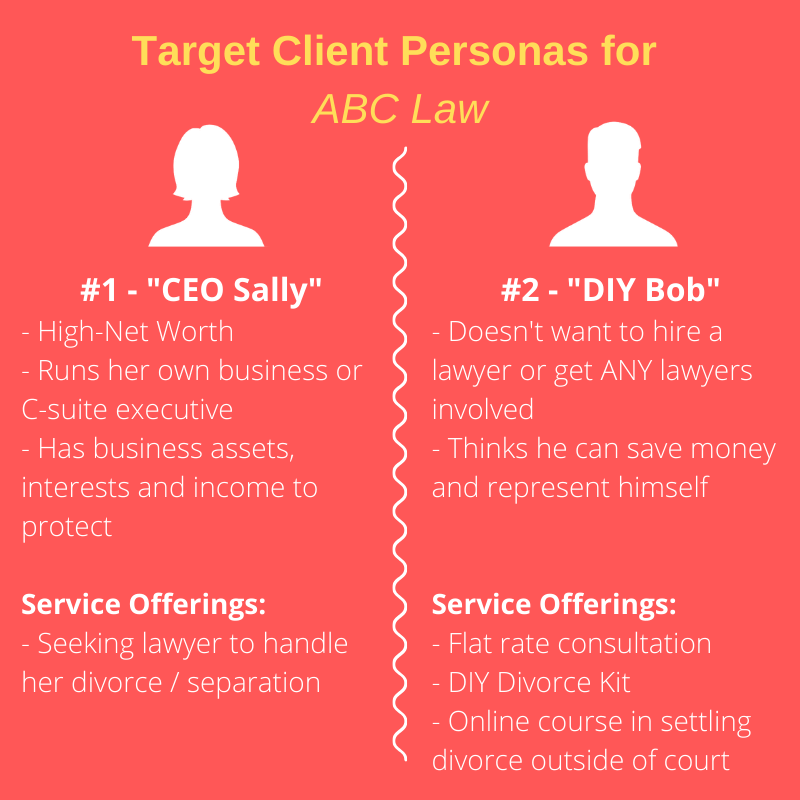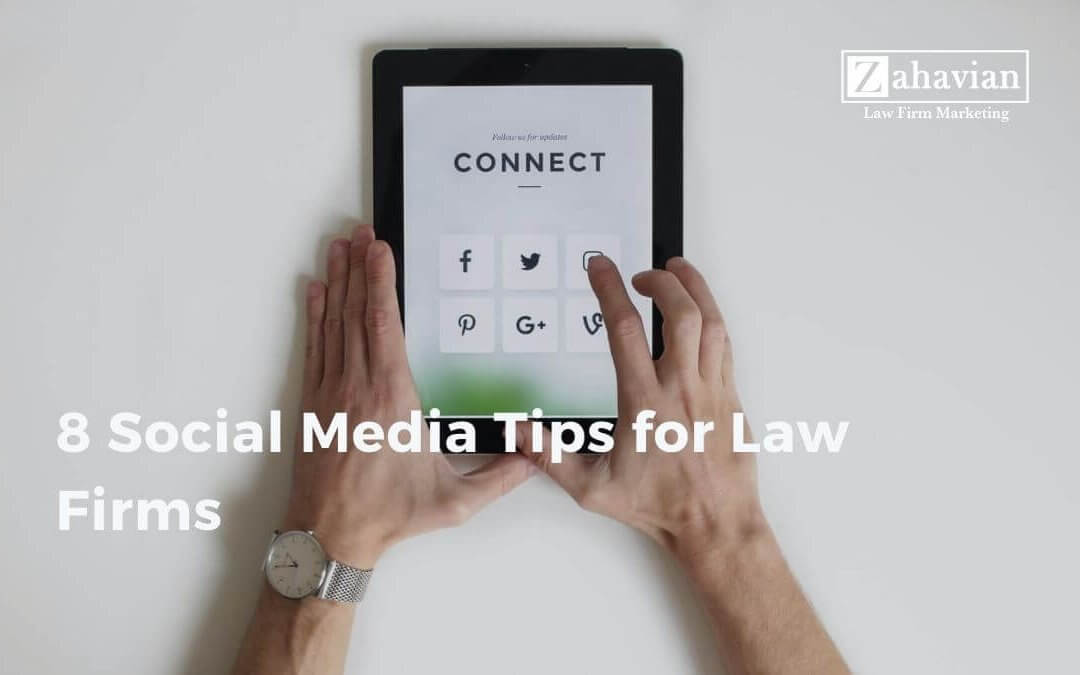Social media marketing is a subject that tends to get mixed responses from lawyers – depending on who you ask. Some swear by it while others avoid it like the plague. As is the case with any marketing channel, the trick is to understand the medium and how to use it effectively.
If you try to use social media marketing for your law firm by writing posts the way you would go about copywriting for a radio ad, it’s likely you won’t have much success. So understanding and adapting your marketing strategy to social networks and the way that they are intended to be used is critical.
In this article, we’ll go over the most important tips for law firms to follow when using social media marketing to ensure their success.
1. Post from your Personal Account
Feel free to set up a company profile or page, but don’t use this to post unless you’re a large firm, especially not as a solo practitioner.
There are several reasons why you shouldn’t do this.
First being, social media companies are businesses and therefore in order to make a profit, they need to charge advertisers and businesses. Therefore, company pages and accounts automatically get less visibility on their posts and social activity than personal profiles. The second reason is that posting from your personal account builds a more personal and deeper connection with people that engage with your posts and content.
The counter argument to this is that you want to use social media to build a brand presence and develop your firm’s awareness. However, it’s rarely the case that people log onto their favorite social networks to see what companies are up to. Company pages should only be used as a primary social profile when you’re large and prominent in your market.
Even large service-based businesses like consulting firms that want to build a brand presence have their employees (the consultants) sharing the company’s posts. So if you’re adamant on using your law firm’s social profile to post, make sure that your lawyers are using their social profiles to share and promote this content to create that deeper and more personal connection.
2. Define your Audience
Before starting to post on social media, you should ask yourself, who do you want to engage with? You’ll want to take the time to answer this question as it will largely define your behaviors and activities on social media – including the network(s) you end up using.
For instance, you could choose to engage with other lawyers in your area so that they can refer work to you. If you practice an area of law that relies heavily on referrals, then connecting with other attorneys and demonstrating your expertise can make a lot of sense.

Another audience that you may consider targeting and engaging with are non-attorney referral partners. For instance, if you’re a personal injury lawyer you may want to engage with physical therapists, auto mechanics and others that come into contact with your ideal clients before you do. Estate planning attorneys should seek out financial planners and other professionals that they can build relationships with to build a strong referral partnership.
These are a few examples of people and audiences you want to use to think about how to go about defining your law firm’s promotional and marketing strategy on social media networks.
Your Audience May Determine the Social Network you Use
The examples we used above seem like an excellent fit for LinkedIn. However, there are great use cases where Facebook and/or Instagram should be your primary networks. In other scenarios, Twitter has great use cases, when you’re a nationally recognized firm, handling large civil cases such as class actions and mass torts. Twitter could also be a great platform to establish your depth of knowledge in a certain area of law and become the go-to authority for journalists and media outlets when they want to interview an attorney on a particular topic or trending story.
For lawyers that already use more community-based social platforms like Reddit, may see a particular use case or opportunity to market themselves on a site they’re already familiar with and have a good handle on.
If you’re new to social media, but want to become a social networking ninja, then talk to others that you know – both lawyers and other professionals – to see how they use social media and find out what’s working for them.
3. Share Relevant and Valuable Content
The content you share will tell a narrative about you over time and engage a specific audience. Depending on who your audience is (see the section just above), you’ll want to post content with them in mind. Some ideas for engaging content that you’ll want to consider sharing as a lawyer include:
- Experiences and stories as a lawyer
- What cases your currently working on
- Tips, advice to your prospective clients and peers
- Share and curate existing content and posts that provides value to your target audience
- Describe your recent case results and how your clients benefited from working with you
- Client testimonials
The key to producing content that wins is asking yourself these simple questions:
- What does your audience want to see?
- How can I help them?
- What do they care about?
If you can provide solutions in the form of social content that addresses any of these questions, then your posts will develop better and better traction and become a staple in your target audience’s social feeds.
4. Engage with other People’s Content
As the old saying goes, “you get what you give”. Remember that if you want people to interact with your content, you should interact with theirs. It sounds simple, but it really works. If you want likes on your posts, then you should like other people’s content. The same applies for commenting and sharing. You shouldn’t expect people (that you want to engage with your social content) to do so if they don’t see you participating.
The key here is to be genuine in what you like, share and comment on. Social media works best when everyone is trying to add value to the content at hand and to others. If you’re not comfortable engaging with a lot of other people’s content or are strapped for time, simply focus on replying to comments and shares on your content.
- A simple “thank you” is all it takes to encourage your followers to participate in the future.
- Sometimes people will comment on your posts with questions, make sure to reply to these and answer it to the commenters satisfaction
A good way to incorporate this into your routine is by coming up with some simple tasks to accomplish whenever you log in to post:
- Like 3 posts
- Comment on 3 posts
- Share 3 posts
This will automatically get more eyeballs on your name and show the people whose content you engage with that you’re participating in their social circle. Now, they’re more likely to reciprocate.
5. Create a Posting Schedule

As is the case with many attorneys, you have a hectic time keeping up with everything as it is. Scheduling content at intervals will ensure that you check several critical boxes in your law firm’s social media strategy:
- You’re posting and sharing content regularly and on a consistent basis
- Consistency is the best way to stay top of mind
- You can easily track the amount of time you invest into participating on social media and therefore measure your ROI
Figure out how many times per week you want to post (I recommend 3 – 4) and just pencil time into your calendar accordingly. Depending on what type of content you’ve decided to contribute to your network, you can use this to build a solid posting schedule. For instance:
- Monday’s post: Client testimonial or story
- Wednesday’s post: Value post for referral partners
- Friday’s post: Talk about a case you’re currently working on or recently worked on
So there’s a weekly schedule with definitive types of content you’re going to be posting about. This is particularly helpful for busy lawyers as they can remove the “creative” element from social media marketing. Now you know what you’re posting about, you just have to find a specific case, story, testimonial, etc. to share.
6. Open up Your Profile
Making your profile public will allow more people to add you to their network, which exposes you to a larger audience when you post and share content. This is an easy way to grow your social media following and reduce the amount of time you spend connecting with new prospects and referral sources.
However, the big downside is that this opens you up to a lot of potential spam requests or just people trying to pitch you on products and services. As a lawyer, others may see you as a big ticket customer, so understand this going into it. I would still encourage you to consider making your profile more public. Just because your profile is opened up and people wanting to sell to attorneys may try to contact you, doesn’t mean you have to engage with them.
7. Use the Right Type of Media
Social media platforms like LinkedIn, Facebook and Twitter allow for a variety of different media types when it comes to publishing a post.

For instance, you can create content in the following ways:
- Share articles
- Share another post
- Post images
- Text-only post
- Videos
- Live video
These are some of the more popular formats and most common across different social networks.
Publishing Videos
Depending on the size of your law firm and how much time you have to commit, will determine if you invest time into video. My advice is to at least look into it. Many of the social platforms favor videos in their algorithms as they correlate with more engagement and time that people spend on the network. So you gain an advantage over media types out of the gate if you choose to publish videos online.
There are several caveats for lawyers when it comes to posting videos on social media. Namely, the content has to be engaging. The reality is that if a lawyer is going to do a video about legalese, the average person is more likely than not going to want to watch it.
Your main audience should be very specific and your content should be optimized for them. If you include a lot of legalese in your content, then focus your efforts on creating content for other lawyers, because they are likely to care about what you have to say on camera.
Use Personal Images
There are tons of images that will work with social posts. One tried and true type of image that works well all the time is a personal, professionally taken photo of you smiling.

This may sound odd to some, but if you don’t have a photo that pairs naturally with the message in your post, then consider using a photo of yourself. Authentic photos of people always get people to stop scrolling through their feed and pay attention to the post. As discussed earlier, people like building a personal connection with others, so this fits perfectly with the narrative and social media approach. You can keep it professional, while still displaying your personality and likability.
If you have a photo that is relevant to your post, then use it. However, in the case that you don’t, you can’t go wrong with a professional photo of yourself (whether alone, with others or your team).
8. Become an Early Adopter of New Network Features
In order to stay ahead of the competition, social networks are constantly evolving through innovation and launching new features. Years ago, Facebook started with text posts and status updates before becoming more image-oriented. Recently, they were pushing to promote as much video content as possible and prefer it over images. Now, they focus more on “Live Video” than just pre-recorded video. The same is true of other networks like LinkedIn, Twitter and Instagram.
This is a great opportunity for law firms willing to take advantage of it. As new features and content formats are rolled out, the social networking companies typically give early adopters an advantage by automatically sharing the content in more people’s feeds.
Because of their nature, lawyers seeking to use the latest and greatest content formats won’t have a playbook of battle-tested methods for success. So becoming an early adopter of new social content formats will require creative thinking and experimentation. If your law firm is willing to experiment with its marketing, new features and content format on social media networks are an excellent way to do so without spending much (if anything) relative to other marketing channels.
Conclusion
Social media marketing can seem confusing for many who haven’t had much experience or success with it – especially lawyers. That’s why in this article, we looked at tips that are sure to improve your law firm’s chances of success on social media.
Understand that some of these tips will give you an advantage, while others are more critical if you want to avoid the mistakes and pitfalls of social media. These tips and pointers can make all the difference between a profitable and high-value marketing channel and yet another failed experiment when it comes to promoting your law firm and generating more inquiries and cases.


